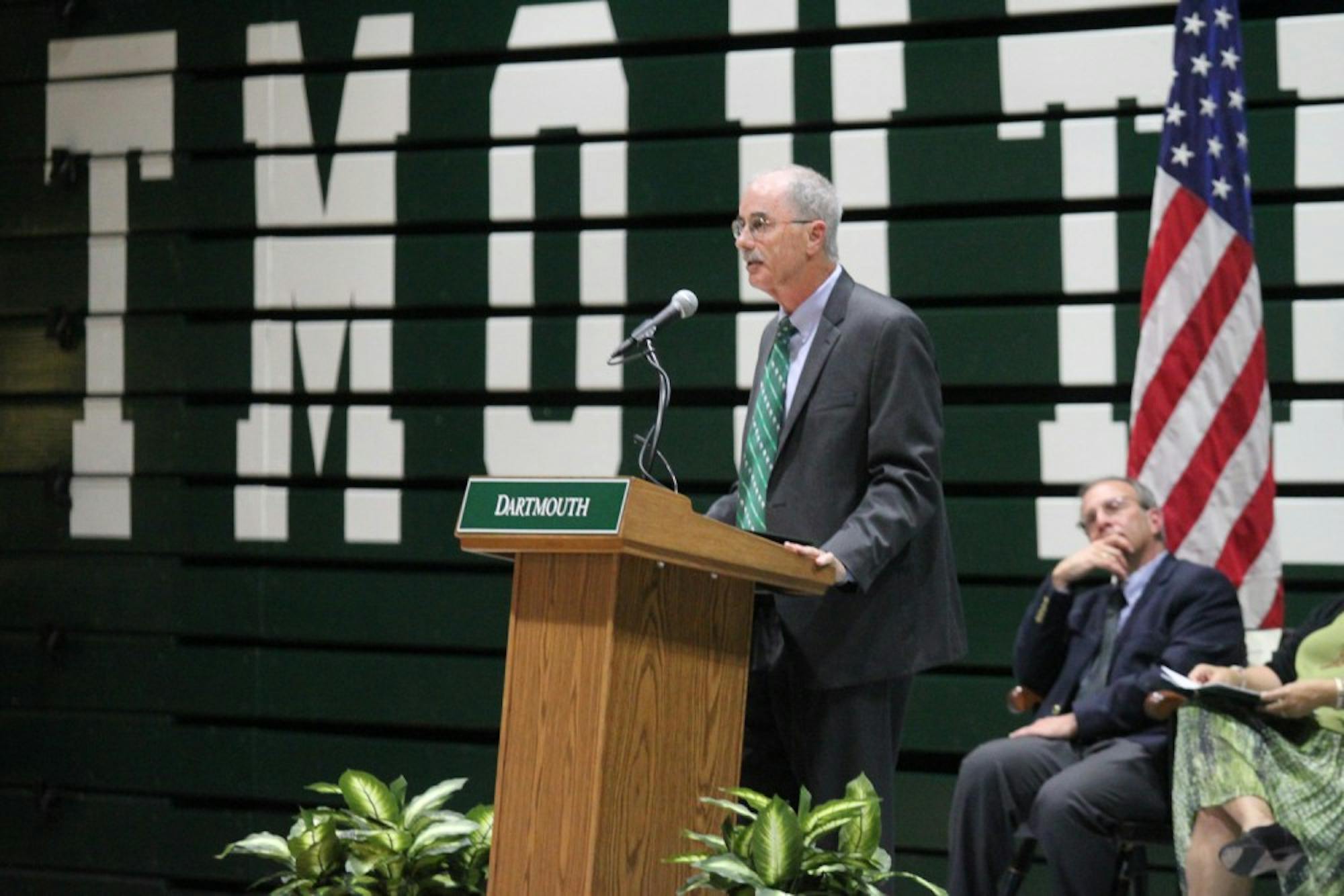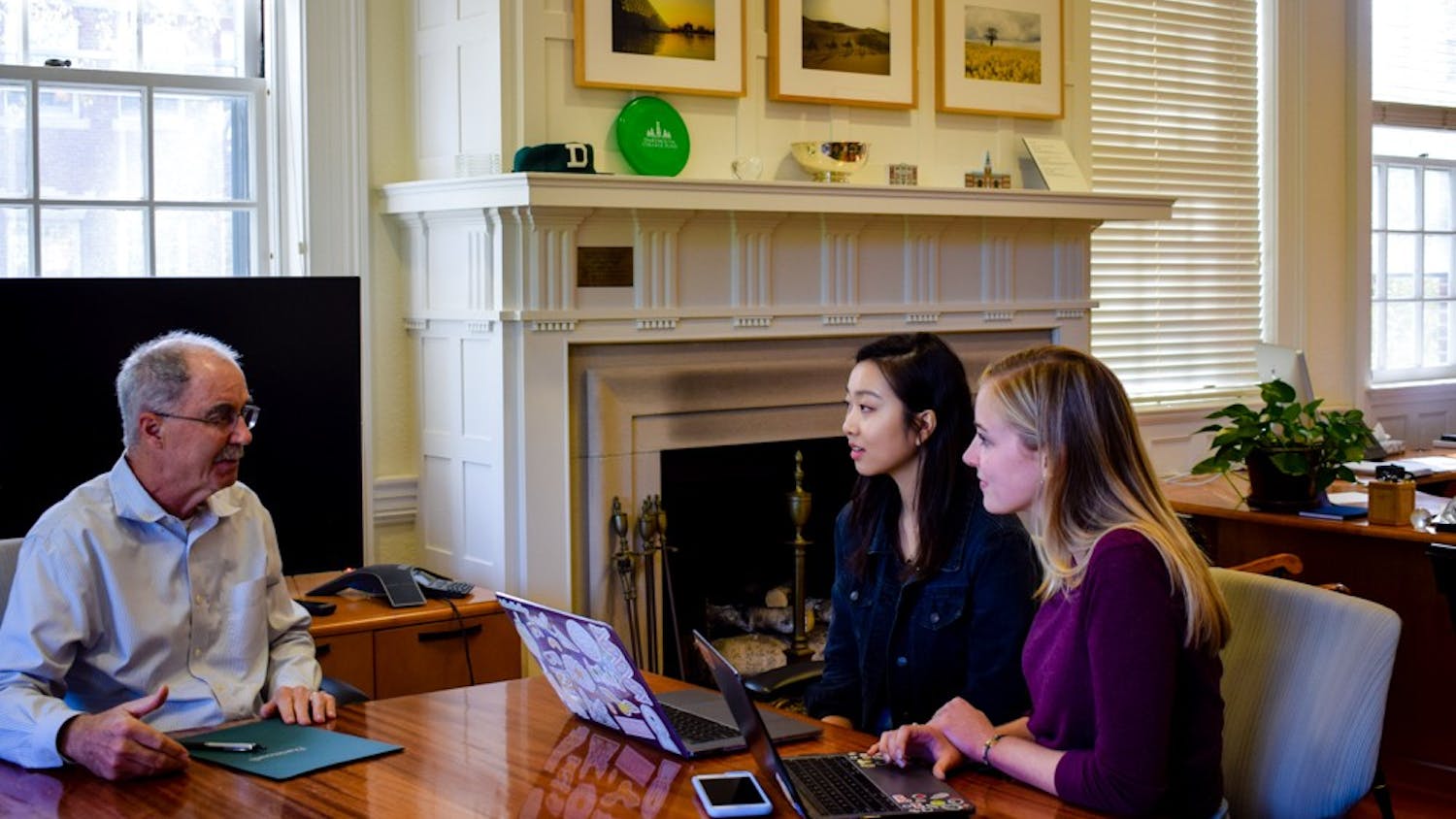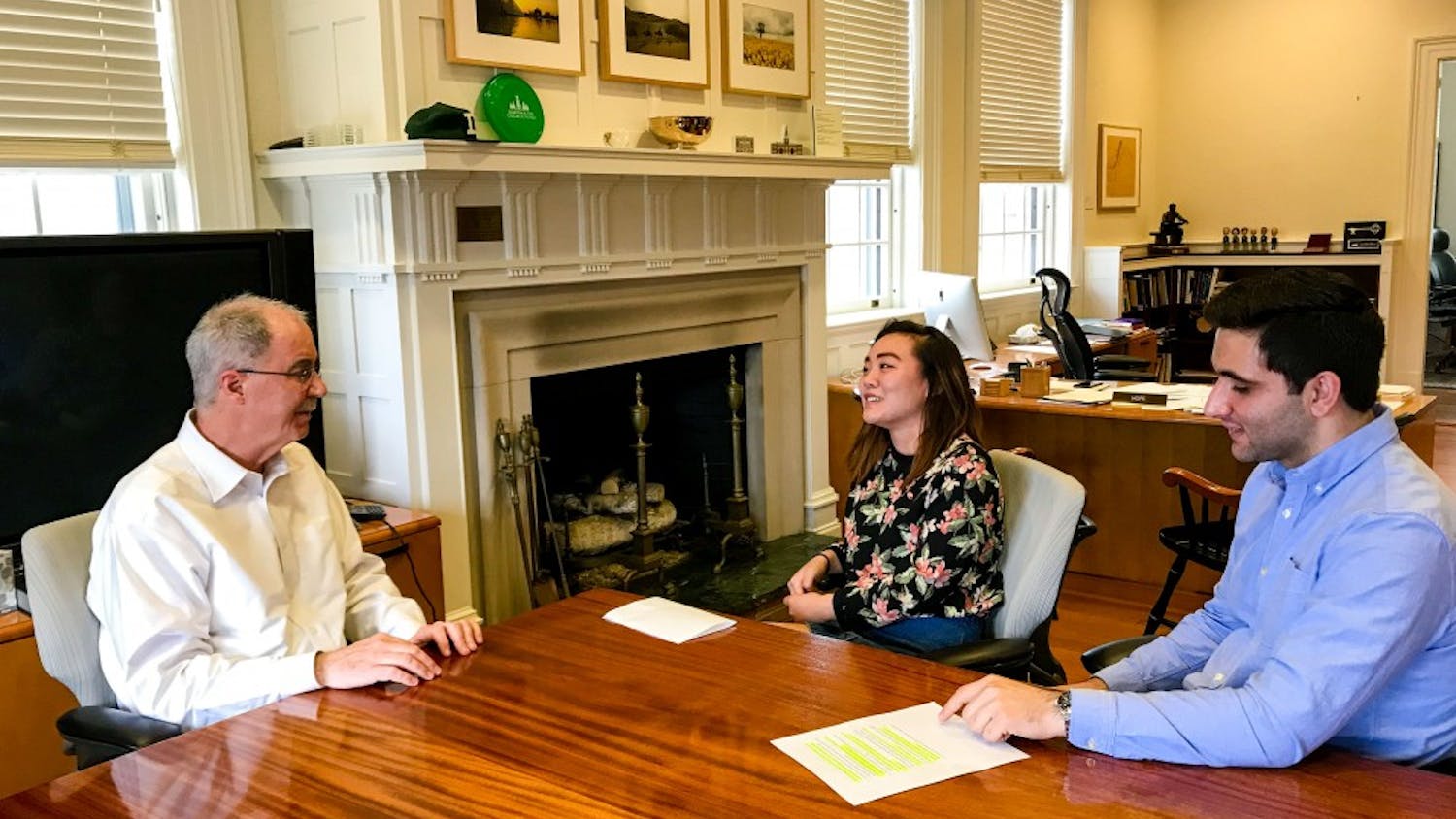Earlier this summer, editor-in-chief Lindsay Ellis and several staff reporters sat down with College President Phil Hanlon and his wife, Gail Gentes, in the Black Family Visual Arts Center Courtyard to discuss his first year at the College, the decisions he has made thus far and plans for Dartmouth’s future.
Gathering opinion
The D: Last summer, you were in the stage of listening to various campus groups and having people over for dinner. To what extent do you recall those conversations, and how have they informed the work you did this year? There were so many of them.
Phil Hanlon: Yeah, but there were some common themes that came out in all of them. I was particularly focused on trying to prepare or synthesize a creative vision for where Dartmouth should go. As I had those conversations and the strategic planning document, and my own views on where higher education is going, it came into more and more focus. Then I began to use those conversations to test things. To say, what do you think about the following ideas?
Setting the tone
The D: It strikes me that the most dramatic move you made that summer was dismissing Rev. Tengatenga. To what extent did that set the tone for the moves you would make for the rest of the year?
PH: I don’t think that was a foreshadowing-type thing. That was just the way I would handle any personnel decision. I listened to all the sides. Finally, it was the classic difficult decision in the sense that there were people on both sides that you respect and arguments that make sense on both sides. Ultimately, I decided I just had to meet the person, so I had him come visit and spent a couple hours with him. That’s the point at which I made up my mind. I don’t think — it wasn’t meant to be a signal of anything in particular. It’s just how I would handle it.
Inclusivity
The D: That was your first statement on inclusivity — it was how you presented that decision. Did that particularly set the tone for the rest of the year?
PH: It represented how seriously I take inclusion and diversity as strengthening our campus. We are preparing people to go out into a world that is increasingly diverse, increasingly global. In order for our students to be leaders in such a world, we need to know how to work with people from very different backgrounds and cultures. We need cultural awareness. It’s also the case that having a diverse campus, an inclusive campus in which everybody’s involved — there’s lots of research that shows that leads to the best decision making. I don’t know if you’ve ever read the book “The Difference” by Scott Page. I would advise anyone to read that. It’s a kind of synthesis of reporting of decades of research that show that when certain kinds of decisions are being made, diverse groups of smart people do better than homogeneous groups of experts. There’s really interesting work on group IQ. Individual IQ makes sense because it has been long recognized — if you are good at one kind of cognitive task you tend to be good at lots of different cognitive tasks. There’s this idea of IQ, which is how good you are at cognitive tasks. Groups, it’s been shown, also have an IQ. You might ask what determines the IQ of a group. An article about two to three years ago had convincing research on this question. It’s not related to the individuals of the group. You might say the highest IQ of the group determines it, or the average IQ. It has nothing to do with that. It has to do with the empathy of the group. How empathetic the group is, how much they can understand each other’s positions. If we think of our campus as a group, how do we maximize our own intellectual effectiveness? Having an inclusive campus is one way to do that.
Transitions
The D: You’ve spent time gathering information and settling into the role. But our time at the College is halfway through, and there have been two years of transitions in administration. What would you say to ’16s in that regard?
PH: Hopefully the transitions in administration haven’t impacted your academic experience. We accomplished a lot this year, and I’m excited by that. One of those things was to put in a senior team, which is a great team. We’re all here for a long while, and you’ll see a lot of stability going forward.
Leading with a problem
The D: The presidential steering committee has been intensely gathering opinions, but they will be translating that into action very shortly. What about this committee is different from what we have seen in the past two, three years? Why are they so motivated to act now when in the past similar committees haven’t had that same power?
PH: When I spoke in April, I said we had a problem that we had to fix. What I didn’t say is here’s the solution. One reason for that is: the mistake that I’ve made most often, and I’ve seen other people make in administrative positions, is what I call leading with a solution, rather than leading with a problem. In other words, you recognize a problem, and you want to fix the problem, you see something you think is going to work. Instead of talking to the stakeholders about the problem, you talk to them about the solution. You say, “Here’s what we’re going to do.” That’s not an effective way to go. First, it doesn’t treat the stakeholders with respect. It doesn’t gather their ideas, which may be better than the idea you have. One of the real purposeful things about the steering committee is that they are leading with a problem. Here is the problem — I want the best ideas everybody has. That is a very powerful way to start. All of a sudden, they’ve got an amazing, rich set of ideas to choose from. That is one reason it seems like it’ll go into action so fast, because they’re starting with such a strong basis.
‘What are the barriers?’
The D: Backing up to when you had that summit and acknowledged the problem — when did you decide to go out in front of everyone and talk about this?
PH: One thing we all know is that the extreme behaviors are not unique to our campus. One thing to be clear on is the biggest reason to stop them is that they’re harming people on our campus. You’re asking a different question — why now? That’s always been there. That originated in the March trustee meeting. There was growing excitement recognized around the vision laid out in November. At that point the trustees knew about the historic $100 million gift. There was a lot of excitement and enthusiasm. We were ready to leap forward. Like a good board, they asked what are the resources we’ll need, and we talked about that. But then they said, “What are the barriers?” As we discussed what the barriers were to achieving the vision, we all began to realize that these behaviors are a barrier. They’re a barrier in part because they divide our campus so dramatically. Part of that is because the community is so tight. You saw how divisive some of these incidents can be. The Parker Gilbert trial. They divide the community, they take up energy, they take time, they distract attention away from what we really need to be doing, which is trying to achieve this vision. We said, “We’re going to do great things here at Dartmouth, but we need to fix these problems.”
A place for big ideas
The D: Speaking of the $100 million donation. Where do you see Dartmouth going in 20 years?
PH: I’m sure I won’t be president in 20 years, but if I was, what would I like to be telling you about the campus? First, that we are a magnet for talent. It’s all about talent. Specifically, the very best students in the world want to come to Dartmouth because of the really amazing learning opportunities and the chance to work closely with outstanding faculty. Some of the very best faculty in the world want to come here because of the scholarship we’ve done and the chance to work with amazing students. Number two is, I want this campus to be intellectually energized, alive, risk taking. Characterized by innovation, by bold thinking, with the courage to take on really big problems. There is a reason that is so important for a place like Dartmouth. It’s because of our talent and our scale. Compare Dartmouth to where I was before, the University of Michigan. Michigan is gigantic. The research enterprise is gigantic. It covers almost any subject you can think about. If the University of Michigan just makes incremental advantages in every area, they can still make a big imprint on the world. We’re at a much smaller scale. We need to make our footprint by having the home run ideas, the really big important breakthroughs. That’s why it’s really important in my vision that we do become a place that is really alive, really energized. The last thing to say is I would like student life outside the classroom to be characterized by the work you do, the creative work, the artistic work, the research work you do. You’re taking ideas into action through social ventures and business startups. Rather than people say Dartmouth student life, that’s the social scene. That is what I’d say. Pieces of that vision are in place right now, no doubt. But I want to go all the way with that.
A focus on harmful behaviors
The D: Do you think it’s possible to have exclusive and gendered social spaces while achieving the type of dynamic social scene you would like to see that’s inclusive and does not encourage high-risk behaviors that you’re describing?
PH: To be clear, my intention was that it was that the extreme behaviors holding us back. I am optimistic. One reason I’m optimistic is the progress we’ve made on high-risk drinking, by really focusing on that behavior. We’re not where we need to be, but we’ve moved a long way in a positive direction, if you look at the metrics we’ve got. I think we can make progress. I purposefully focused on the behaviors, and I will continue to focus on the behaviors, rather than say we want to build a whole new social community that we’ve never had before. I’m going to focus just on the behaviors.
The D: Is there a link in either of your minds between these behaviors and space? How is space tied to behavior?
PH: I don’t want to get ahead of the steering committee. I understand why you’re asking, but it would be going down the road of leading with the solution. I’ll let them do their work.
What sets Dartmouth apart
The D: The thing you started talking about with the next 20 years is academics, which attract global leaders who are extremely talented. It seems in your inaugural address you have two ideas geared at that: the entrepreneurial center and attracting postdocs. People sometimes think Dartmouth is moving from a focus on undergraduates to being a university. To what extent do you think this is a trade-off? Is there a way for it to work in tandem?
PH: What characterizes a great university — we are a university. We call ourselves a college, and there are important reasons to call ourselves a college — it brings great minds to bear on the most pressing issues of the day. That’s what universities do. Dartmouth’s distinguishing characteristic is that we are the place where students play the most meaningful role in that enterprise. If you go to other great universities, that work is largely faculty-driven. And postdoctoral. Graduate students get much more involved than undergrads. Here, it’s much different. All students from undergrads on get deeply involved in the process of taking on and grappling with the world’s issues. That’s one of the things I find really attractive here. You look at some of the experiential learning here — the Rockefeller Center policy shop, the Paganucci Fellows. You as students have an opportunity to be out there working in pretty close partnership with faculty. I don’t think they’re all in opposition. The question is who gets involved in the process. Pushing the frontiers of knowledge, taking on — here I think students play a larger role than in other places. The different question in that mix was the liberal arts versus professional training. I think to me the right starting point here is what outcomes you want from the educational experience. You may have heard me talk about this before. With the newest generation of IT platforms generating information and knowledge, to your desktop essentially for free — what we crucially add that these platforms can’t is what I call wisdom, the skills to be successful in the world based on what you know. Powerful communication skills. Critical thinking skills. Having the confidence to innovate and take risks. Being able to work effectively with others. Talk about a cultural humility and cultural awareness. Numeracy. Being able to engage the arts and humanities and leadership skills. The liberal arts has always been about generally applicable intellectual skills. To me the liberal arts remains the most powerful way to deliver those skills to students. The professional schools can very effectively connect students with the outside world. Ask yourself, what is a profession? What does that mean? It’s a framework that takes intellectual learning and applies it to the real world. If you become a doctor, you learn about germs and cells. You learn how to apply it to the sick person who is sitting across the table. That’s what a profession is. If you think about students developing these skills to be successful in the world, a really important piece of that is actually encountering the world. The professional schools can be a huge part of that.
Facing difficulties
The D: On a more personal note, what has been the issue that has kept you up at night the most? What have you lost the most sleep over?
PH: What was the most difficult by far was the death of both Torin Tucker ’15 and Blaine Steinberg ’15. Calling their parents. And meeting their parents. It was devastating. To all of us, I’m sure. That was by far the most difficult.
Gail Gentes: That was so hard to understand.
A themed year?
The D: For Interim President Carol Folt, her banner thing was the year of the arts. I was curious if there was something similar, a similar theme you were considering approaching in the following year.
PH: We’re thinking about a themed year. I don’t want to release anything yet. Stay tuned.
GG: I didn’t know that.
Lessons learned
The D: Looking to next year, is there anything you would handle differently or have learned from this year?
PH: I learned a lot, of course. When issues come up, you handle them the best you can. That’s always a good exercise — would I have done it differently, that’s definitely something. But at the end of the day, I think it’s your core values that guide your decision making at the time, and what you know at the time. But I thought it was a great year. One of the things we both tried to do is reach out to as large of a segment of the community as we could. I think we ended up meeting with 3,100 students in small groups, 500 faculty, thousands of alumni. That was so valuable, and we’ll continue to do that.
Advice for ’18s
The D: Is there something you would say to the Class of 2018 as they’re preparing to enter Dartmouth?
PH: I’ll get a chance to tell them in person, but I think I’d say that they have the most amazing opportunity ahead of them.
GG: I would say, “Get excited.” There’s lots to do.
PH: Challenge yourself, try some things you never thought you’d do. Larry Page, one of the co-founders of Google, there’s some quote he has — do something uncomfortable every day.
This article has been revised to reflect the following correction:
Correction appended (9/10/14):
Due to an editing error, this article did not include that several staff reporters — not just Ellis — interviewed Hanlon. The article has been corrected.




